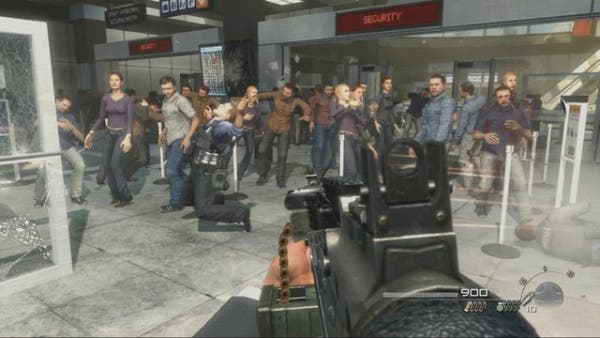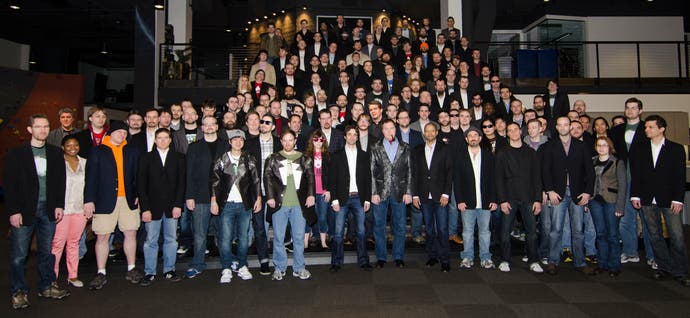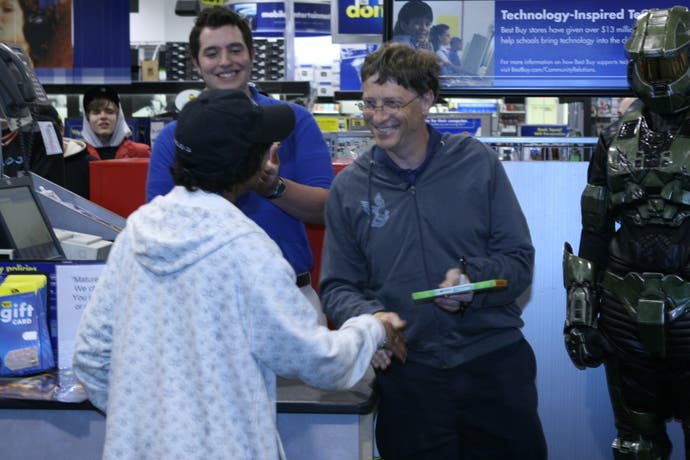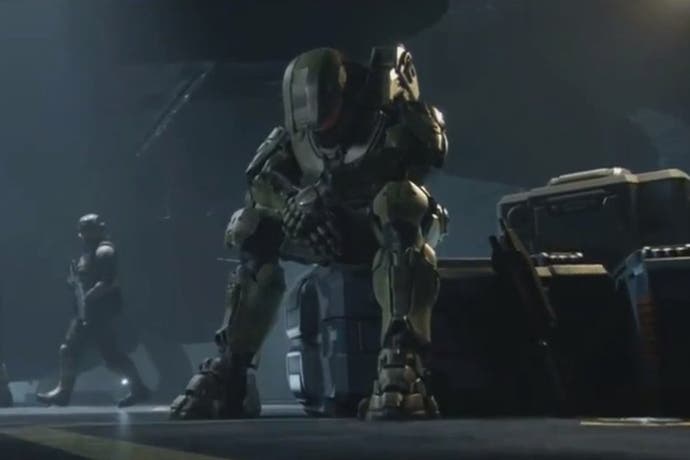Better than Halo?
Stealth Destiny article.
In the run up to the release of Halo 5, I thought a lot about the state of the series in 2015, how my feelings about Master Chief and Cortana and the endless fight to save the universe had changed over the years, and Destiny.
I thought about Halo 5's multiplayer, the cool Warzone mode I'd played at preview events, and how worried I was about a campaign in which the Chief shared screen time with the personality-starved Spartan Locke.
I thought about how much I enjoyed playing Destiny with my clan mates almost every evening, and how unlikely it was that Halo 5 would so much as dent my addiction to Bungie's latest.
I thought about how Bungie had moved on from Halo at the right time, as if Jason Jones, buried deep within the bowels of the developer's Bellevue headquarters, had had a vision of the future, and knew, in a moment of perfect clarity, that Halo's star had dimmed, but another was about to take its place, hovering just over the horizon, packed with potential.
I thought about how Microsoft-owned developer 343 had found itself buried between a rock and a hard place: the reins of a horse past its prime thrust into its hands, and facing the uphill battle of keeping the Halo hardcore happy while appealing to the modern-day first-person shooter fan, who must sprint and who must aim down sights.
I thought about all of these things and imagined writing an article that would compare Halo 5 to Destiny, as if such a comparison would spark some insight readers would enjoy. I imagined I would come to the conclusion that Destiny killed Halo, and in the process explain why I and so many of my friends who grew up playing Halo had moved on, leaving poor Master Chief behind: a relic, a spent force, a faded star.
Now Halo 5 is out, I've reviewed it and I've put hours into Warzone and all the rest, I've come to realise that Halo's managed decline is about more than Destiny's rise to prominence. It's about a whole load of things. It's about Xbox versus PlayStation, it's about the evolution of the first-person shooter, and, most of all, it's about Bungie doing a Madonna.
There is, though, a wonderful symmetry to the Halo/Destiny divide. After Microsoft bought Bungie in 2000, the developer settled inside a business complex at 434 Kirkland Avenue, not far from Microsoft's Redmond campus. After Bungie bought back its independence in 2007, it found a new home in Bellevue. I've visited the office a number of times. What was once a cinema and bowling alley is now a huge open-plan office with spacious first-floor meeting rooms, a life-size Master Chief statue in reception and a climbing wall.
Microsoft, in its wisdom, decided to set up 343 Industries at Bungie's old office at 434 Redmond Way. How intimidating it must have felt not just to fill Bungie's shoes, but to fill Bungie's old digs. Fate, it seems, is not without a sense of irony.
Post-Halo 3, Bungie, officially, remained 100 per cent committed to making Halo games for Microsoft. But with ODST and Reach, Halo games that weren't quite fully-fledged Halo games, you could feel the studio's attention turning toward something else. That something else turned out to be Destiny, a game Jason Jones had dreamt up years previously. (There's even a Destiny Easter egg in ODST.) Destiny loomed over the horizon even then, its virtual fibres baking back in Bellevue.
As Bungie penned the final chapter of its Halo story, Call of Duty rewrote the video game rulebook. A couple of months after the launch of Halo 3, Activision unleashed Call of Duty 4: Modern Warfare, and shooters on consoles changed forever. Infinity Ward's FPS captured the hearts and minds of a new generation of players with its blisteringly fast 60 frames-per-second gameplay and brutal competitive multiplayer. Halo's slow and floaty feel seemed pedestrian in comparison. Developers often talk about the "time to kill" in their games. With Call of Duty all it took was a millisecond. For many, a Spartan's overshield was a barrier too far.
Call of Duty continued its meteoric rise to world domination: World at War's Zombies, Modern Warfare 2's No Russian, torture in Black Ops... Call of Duty raised the eyebrows of a befuddled British media while an army of gamers fought through Prestige after Prestige after Prestige. Halo was yesterday's news. Call of Duty was all the rage.

By the time Halo 4 came around, Master Chief and co didn't seem to matter as much. Bungie had checked out, and its body double was bogged down by cynicism. I remember the comments: "Without Bungie, Halo is nothing." "I don't trust 343." "I don't trust Microsoft." 343 could have made a masterpiece. It could have made Half-Life 3 for all the good it would have done. Things just weren't the same.
Halo 4 came and went at the end of the Xbox 360's life and it was fine. But that's all it was: fine. And for Halo, fine was nowhere near good enough. The multiplayer - the lifeblood of Halo - failed to capture the attention of the Halo hardcore and the Call of Duty crowd weren't fussed. But it was 343's first stab at the series. Indeed, it was its first game. A valiant effort in the circumstances, I thought. And those graphics.
But already you could feel Halo's star had dimmed. I don't remember Halo 4's launch with the fondness I do Halo 3's, Halo 3: ODST's, or Bungie's wave goodbye to the series, Halo: Reach. Halo 3's launch was an event on the only console that mattered. This was the complete package, peak Halo, and it was wonderful. Halo 4 was... fine.
Then, in 2013, Microsoft dropped the ball. You know the story; the Xbox One was underpowered. It wouldn't let you play your mates' games. It wouldn't let you play second-hand games. It was too expensive. It came with Kinect. It even spied on us. Sony, cackling behind E3 press conference curtains, couldn't believe its luck. From the start, the PS4 raced into an unassailable lead - one, you suspect, the Xbox One will never recover from.
In the UK, it amounted to a role reversal. Last generation, we'd followed the US market pretty closely, with the Xbox 360 dominating the PS3. On these shores Xbox 360 exclusives almost always outsold PS3 exclusives. It was a similar deal for games made by third-party publishers. For so many, the Xbox 360 was their Call of Duty or FIFA or Minecraft player. Nothing more; nothing else.
Fast forward to 2015, and it's the PS4 that dominates with an install base that's sparked shift of allegiance among publishers (there's a reason Call of Duty maps will be released on PlayStation before Xbox.) Halo's fate is intertwined with Xbox. Halo: Combat Evolved drove the original Xbox's success. Halo 2 drove the success of Xbox Live. And Halo 3 secured Xbox 360's position as the console of choice in 2007. But Halo is not the force it once was. No longer can Microsoft bank on Master Chief to sell consoles. And so, Halo 5 is hamstrung by a console that lags behind its competitor. What might have been had Microsoft not messed up the launch of the Xbox One?
And then there's Destiny.

Where to begin? Here we have a different type of shooter, one never before seen on console. I'm not going to get into the game's many flaws, nor how divisive it is. That's all well documented. What I will say is that, from day one, it captured my attention, rekindling my love of console first-person shooters by zeroing in on what I enjoyed most while playing World of Warcraft: raiding with friends.
Bungie managed to create a game so fiendishly addictive that I - and so many of my friends - played it for a few hours each and every day. I played to get s**t done, and with a game so grindy, there was always a lot of s**t to get done. If it wasn't levelling up a weapon or a new piece of armour, it was playing a Nightfall mission on the hunt for new exotics, or farming for Strange Coins ahead of the arrival of superstar vendor Xur each Friday morning. Much of Destiny was repetitive, inane, and boring as hell. But the gunplay was so slick, the weapons so interesting, and the pull of keeping up with my friends so irresistible, that I couldn't help but throw myself, hook, line and sinker, into it all.
The first time my clan, Des Tiny OMG, ventured into the Vault of Glass. The banter. The discovery. The stress. The joy. The delight. The loot. The lack of loot. The disappointment. The satisfaction. The whole thing. Eventually I'd play on autopilot, chatting about this and that, football, love, the meaning of life, then, oh yeah, we're on a boss, we should probably concentrate for a bit while we snipe its bullet sponge gut into oblivion. Logging on to Destiny is like meeting my mates at the pub. At the end of the night I assess the damage and find my wallet lighter and my brain cells destroyed, but, oh boy, the laugh we had.
Halo 5 came out last month and it just didn't feel like an event. Its competitive multiplayer is great. It really is. The "Golden Triangle" of shoot, melee, grenade is present and correct, Warzone is the most interesting thing to happen to Halo in years, and I found the campaign decent fun for eight hours. But the pull to return day after day isn't there. Halo 5 is an exclusive on a console many of my friends aren't using. Why play Halo 5 multiplayer on my lonesome when I know at least a few of my friends will always be playing Destiny, getting s**t done?
This is the problem: while I'm playing Halo 5, I'm not playing Destiny. While I'm playing Halo 5 I'm having a perfectly good time, but I can't shake the feeling that I should be elsewhere. I should be in party chat, crying with laughter, losing it when a clan mate gets that exotic weapon he's been chasing for a month, punching the air when we finally defeat Oryx.
Perhaps it's about progression and persistence, this idea you're making headway in a universe you share with your friends. All games, it seems, must have these RPG-lite mechanics, little hooks that dig deeper and deeper under your skin until you're little more than a puppet on a string. It's at this point that you dance to the developer's tune, as I have done to Bungie's cunningly composed ditty for over a year now. My Guardian must improve, get better, stronger, more productive, more powerful, wielding ever shinier tools. And then I dance in the Tower with my friends, proudly waving my trophies, each a testament to my dedication, evidence of my devotion.
Halo 5 has none of this. It is surprisingly archaic, in a way, with a linear campaign that has its moments but won't linger long in the memory, and a separate competitive multiplayer with its own progression system. Yes, you gain experience points and level up your Spartan Rank no matter which PVP mode you play, but all this unlocks is the ability to earn better REQ Packs, something I'm not particularly interested in. And all REQ Packs do is give you a chance at getting new skins for your Spartan's armour and weapons. Again, not that bothered.
Warzone is the most interesting thing to happen to Halo competitive multiplayer in years, but you play for little more than the glory of victory. In 2007, that would have been fine. Now though, I'm not so sure. As a time-starved 30-something, I am faced with a decision: do I play Warzone, a fun mode that helps me buy more REQ Packs? Or do I play Destiny, a game in which no matter what mode I play, my Guardian gets s**t done? For me, the answer is simple.

Is Destiny better than Halo? People are playing and enjoying Halo 5, and that's brilliant. People are playing and enjoying Destiny and that's brilliant, too. And I absolutely, unequivocally accept that for many people, Halo 5's multiplayer is just what the doctor ordered: the perfect antidote to the unwelcome RPG-ification of the modern shooter. That's how I felt about it at first, burnt out as I was with the Destiny grind. But as someone who really does love the Halo universe, it saddened me to watch Halo 5 come out and not change the f***ing world, as Halo did on the original Xbox, as it did with Xbox Live, as it did with Halo 3. Games have moved on. I've realised that I have, too.
Jason Jones and Bungie saw it coming, I reckon. They saw Call of Duty and all the cool kids flock to a different type of shooter, and thought, how do we repeat the trick? How do we do a Madonna and reinvent ourselves? Warts and all, the answer was Destiny. And despite its success, I bet every now and then Bungie remembers the glory days of Halo, and raises a glass to the Master Chief.
I know I do.










